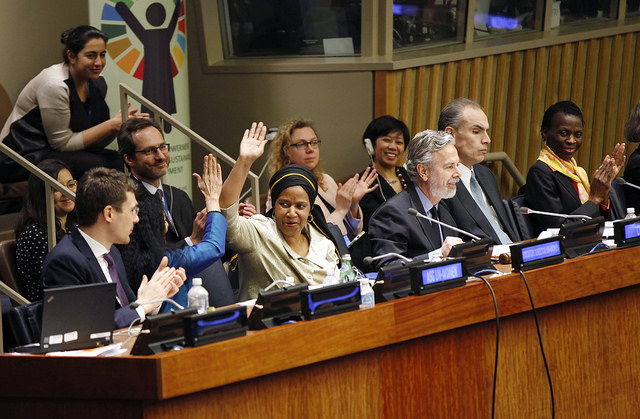Commission on the Status of Women and Gender Parity in Humanitarian Crisis

Photo by UN Women.
The 60th session of the UN Commission on the Status of Women concluded last week highlighting the importance to the gender-responsive implementation of Agenda 2030 and UN Member States agreeing on rapid progress, including stronger laws, policies and institutions, and scaled-up financing (UN Women, Press Release, 25 March 2016). The agreed upon conclusions call for gender perspective integrations across all Sustainable Development Goals (SDG), including SDG4 Quality Education. CSW had one of the largest attendances to date and a Global Business Coalition for Education member, NRS International, participated in various side events along with 80 government ministers and 4,100 non-governmental representatives from more than 540 organizations.
CSW and the Private Sector
This year, NRS International attended various CSW side events on toppings ranging from education to the refugee crisis. Our aim is to understand how we, as a private company, can better support the Agenda 2030 through practical business practices. However, as one of the few representatives from the Middle East region and from the private sector more generally, I felt like the conversation was incomplete. While topics touched on the private sector’s ‘value add’ and ‘critical contribution’ needed to meet the Agenda 2030 more broadly, it rarely included the private sector voice. Even during the Q&A sessions, representation from Africa and civil society dominated the conversation, leaving little space for companies to speak up.
One event, contrary to the majority of the conversations, that did capture the private sector’s vision at CSW was the UN Global Compact’s Women’s Empowerment Principles (WEPs) Annual Event. The UN Global Compact is the largest sustainability initiative in the world which serves as the moral authority of the UN and integrates its values in companies’ sustainability practices. In 2010, the UN Global Compact and UN Women launched WEPs, a set of principles for businesses that provides guidance on how to empower women in the workplace, marketplace, and community. Our work at NRS International was highlighted at the event, and I was given room to speak about our commitment through reviewing our day-to-day practices and policy in accordance with empowering, advancing, and investing in women worldwide, starting with our own employees and throughout the supply chain.
CSW and Humanitarian Crisis
CSW highlighted the imperative of empowering women in leadership and decision-making in all aspects of responding to and recovering from crisis. Various official and independent side events highlighted this need; however, voices from the women themselves were absent due to the various difficulties with travel and visas. The first-ever World Humanitarian Summit, taking place in Turkey later this spring, will offer a platform to tackle the difficult challenges facing men, women, and children and call for leadership commitment for global action. It is well documented that humanitarian crises and other emergencies disproportionately affect women and girls. Within months of the Ebola outbreak, for instance, early-forced marriage skyrocketed along with teenage pregnancy, as families pulled children out of school to shore up additional financial resources in any capacity that they could. In recognition of these challenges, the Summit will encompass the critical needs of women and girls in crisis settings, with results-oriented and forward leaning pledges made by leaders.
GBC-Education Serves as a Vital Platform
As GBC-Education has pointed out, if the private sector is not included in this dialogue, then women and girls across the globe could miss out on innovative solutions to empower them in the face of crises. By tapping into the ingenuity of the private sector, which can not only contribute fluid financing solutions, but their core assets as well, then the international community can build stronger partnerships with more impactful gains.
At NRS International, we design, develop, and manufacture core relief items, public health products, and solar solutions from the United Arab Emirates and Pakistan, and train our employees so that they are well-versed on the hurdles the international community face as they respond to crises and emergencies. We have not only donated various products to support community-based activities, both in Syria and in Lebanon, to support women and children refugees, but provide employment for Pakistani women as well. We joined GBC-Education initially because of its commitment to education in Pakistan but its Education in Emergency priority has enabled us to contribute more meaningfully. The massive Agenda 2030, CSW, and the upcoming WHS must continuously and consciously engage the private sector to reach its comprehensive goals and coalitions, such as GBC-Education allows our voices to be heard.
Who we are
NRS International is a family-run business that designs, manufactures, and supplies core relief products for the humanitarian aid, public health, and development sector. Our mission is to alleviate suffering of vulnerable populations through providing high quality, cost-effective essentials, while simultaneously providing economic opportunities. Our subsidiaries include NRS Relief, TANA Netting, and Flexiway Solar Solutions. We are headquartered in Dubai, United Arab Emirates for logistical efficiency.
Follow us on Facebook and via Twitter, @nrsrelief.
 Ms. Nicole Malick is a CSR Manager for NRS International based in Dubai. She is an international social worker recognized for her ability to effectively design programs that address corporate social responsibility, gender empowerment, peace building, youth engagement and human trafficking. Nicole’s ten years of international experience, spans the Middle East, Asia, and East Africa with public, non-profit, social enterprise, and multi-national companies.
Ms. Nicole Malick is a CSR Manager for NRS International based in Dubai. She is an international social worker recognized for her ability to effectively design programs that address corporate social responsibility, gender empowerment, peace building, youth engagement and human trafficking. Nicole’s ten years of international experience, spans the Middle East, Asia, and East Africa with public, non-profit, social enterprise, and multi-national companies.
